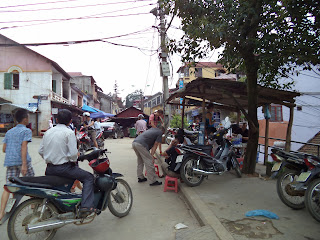To
get to SOC café and office, you turn right out of the hotel and start up the
first hill. On your right you’ll pass the dingy little stand where a woman
cells cigarettes and cold drinks and men hang out all day drinking, gambling,
and arguing. After dark, the motorcycle toughs and drinkers and serenaded by a
old blind Hmong man playing a wooden flute for pocket change. On the opposite
corner a man offers you a motorbike ride every time you pass. There may be a
gaggle of Hmong girls and women on the corner two, having been herded there by
the tourist police. Then you plunge into the market, through the fruit and
vegetable stalls, dodging tourists and local shoppers and alight your first set
of uneven, slippery stairs. The passage through the upper level of the market
is a knot of sellers and buyers of everyday goods and trinkets on the left, and
handicrafts and fancier-looking “authentic” trinkets on the right. Then it’s
down the few stairs clogged with sellers, onto the street swarming with
motorbikes and dominated by the occasional bus. Turn left on the main street of
Sapa Town, heading away from its center and up another hill.
A
lot happens on this street, unfortunately most of if alcohol-related. Once I
saw a drunk man heave a very large rock at the back of two people on speeding
motorbike. Worse, one afternoon I watched – as if that was going to do some
good – a drunk young man with a K-Pop hairdo drag his girlfriend down the hill
by her arm. She was pleading and beginning to cry, and feebly hitting him with
her shiny red clutch handbag, braking hard in her platform shoes on the steep
slope. You used to see a buffalo in town every now and then, but the police
must be keeping them away, too. Continue up the hill past the tourists eating
bad food on pretty terraces, past the massage places and the Be-Bop disco,
through the intersection where yet another gang of men hawk motorbike rides or
bikes for rent. You will be walking in the street up this hill because Hmong
and Dao women have spread their tarps and their wares across the sidewalks on
both sides. Some are very old, and some are very young. Women have babies on
their backs and lying on blankets under leaning plaid umbrellas. You try to
tell yourself you’re doing the right thing when you say “no shopping.” Ann
walks through here and gives fruit, juice boxes of milk and books to the
children. You wish you were that kind of person.
This
second, and much longer, set of stairs feels like something of a relief because
there are fewer, if any sellers there, but it’s trash-strewn and smelly. At the
top, turn right and coast a little downhill while you catch your breath.
Sometimes another (the same one?) blind flute player sets up shop at the top.
If there’s room to walk on the sidewalk, that’s best because this road is
curved and busses, trucks, and motorbikes drive as if it isn’t. On the right
you pass a guest house, a barber-shop/beauty parlor/massage parlor, an indoor
roller-blading rink, of all things, and an incongruously diurnal karaoke bar.
The sidewalk is patrolled by a very pregnant dog, toddlers who occasionally
break free of their handlers and wobble toward the busy street, and the
clusters of teenagers that skating rinks all over the world attract.
 | |
| View from the top of the stairs. |
 | |
| View from near the bottom. |
Last
week they emptied out the massage/beauty parlor to make way for the rumored
pool hall, and put the trash on the
street. Who doesn’t love Christmas in July?

















